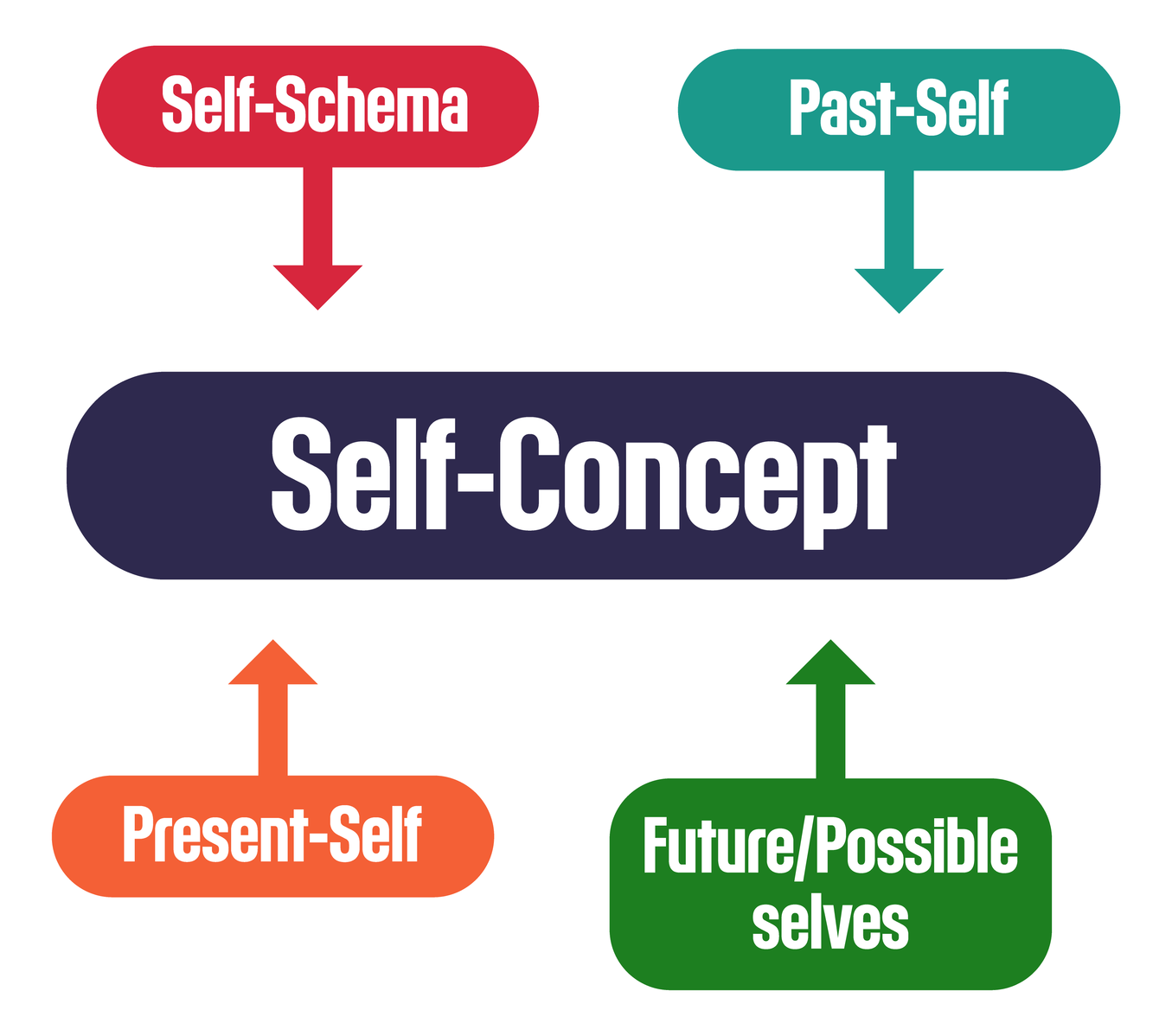Difference Between Self-Concept and Self-Esteem
Self-concept and self-esteem are two psychological concepts referring to an individual’s view of oneself. Both concepts have been absorbed into our modern daily lives with a slight difference from how researchers conceptualize them. The ideas revolving around self-esteem especially have been widely applied to many societal institutions, from kindergarten to the corporate world. Self-concept is a lesser known idea but is still widely applied by therapists and counselors.
Though similar in that they are subjective perceptions of the self, these two concepts are very different. Self-concept is a more encompassing self-perception than self-esteem. They have different components and different manifestations in a mentally healthy individual. More about these two psychological constructs and their differences are discussed further in the following sections.

What is Self-Concept?
In a nutshell, self-concept is an individual’s overall knowledge or perception of who he or she is; the ultimate answer to the question, “Who am I?” The earliest known consideration of the idea of a self is that of philosopher Rene Descartes who related existence to personal perception. Another prominent thinker on the idea of self is Sigmund Freud who proposed the term ego as something that regulates the other aspects of a personality. Freud’s ideas have so influenced personality psychology that many theorists who came after him still equate the ego with the self. In the late 20th century though came the most well-known theory, the self-concept theory of personality of Carl Rogers. Rogers proposed that the self-concept is made of three components, the self-image, the ideal self and the self-worth which is more commonly known as self-esteem.
Self-concept develops throughout the lifespan of an individual and is influenced by many factors. Most theorists agree though on two main ones, biological factors and environmental factors which include social interaction. According to Carl Rogers, a person with a healthy self-concept has foremost a congruent self-image and ideal self. This congruence allows for a healthy self-worth, which in turn results to a fully-functioning individual that strives for self-actualization.
With its broad conceptualization, self-concept has some similarities with other terms. Aside from being a component, self-image is different in that it is a perception of the self that may not necessarily align with reality. Self-esteem is different in that it is a perception of worth or value while self-efficacy is a perception and judgment of one’s own abilities. Finally, self-awareness has to do with being conscious of one’s own being and all its aspects.

What is Self-Esteem?
Self-esteem, at its simplest definition, refers to an individual’s perception of his or her own worth or value. This is simplified further outside of the scientific community as just being how much one likes oneself. The earliest known conceptualization is that of William James who even had a formula for self-esteem, which is the ratio of an individual’s successes to that of his or her expectations; the higher the success or the lower the expectations, the higher the self-esteem. The concept has later come under heavy influence from the humanistic school of personality, led by Carl Rogers and others. Today’s most famous conceptualization of self-esteem came about in the late 20th century. Abraham Maslow, a contemporary of Carl Rogers in the humanistic school of personality, proposed that self-esteem is a need that every person has and must eventually satisfy. Society has taken this particular concept of self-esteem as a need and incorporated this to almost every institution of society, making sure that every individual develops a high self-esteem as early in a person’s life as possible. Also in the late 20th century was Nathaniel Branden, who theorized that self-esteem is composed of self-efficacy and self-respect. Self-efficacy is the confidence in one’s abilities while self-respect is the belief that one is deserving of happiness, achievement, and love.
Similar to self-concept, self-esteem is influenced by biological and environmental factors including social interaction. However, self-esteem is also influenced by self-concept itself, along with the components of self-concept, namely self-image and ideal self. With a healthy self-esteem, an individual mainly has confidence, a positive outlook and a realistic valuation of his or her strengths and weaknesses.
Self-esteem is commonly confused with but differentiated from self-regard, which is the consideration or respect one has for oneself. It is also different from self-efficacy, which is the valuation of one’s abilities. Of course, also different is self-concept, which is a more overarching perception of oneself.
Difference between Self-Concept and Self-Esteem
Definition
Self-concept is an individual’s overall perception of him or herself. It is usually the answer to the question, “Who am I?” Self-esteem on the other hand is an individual’s perception of his or own value, an answer to the question, “How much do I like myself?”
History
The notion of the existence and perception of self was first explored by philosopher Rene Descartes and modern conceptualizations of the self-concept was heavily influenced by Sigmund Freud. Ideas about self-esteem was first explored by William James with succeeding influence from humanistic ideas led by Carl Rogers
Leading theory
The most famous conceptualization and theory on self-concept is that of Carl Rogers while most influential on self-esteem is Abraham Maslow.
Components
According to Carl Rogers, self-concept is composed of self-image, ideal self, and self-worth. Meanwhile, self-esteem is composed of successes and expectations, according to William James, while Nathaniel Branden theorizes that it is composed of self-efficacy and self-respect.
Influencing factors
Self-concept is influenced by biological and environmental factors including social interactions. Self-esteem is influenced the same and Carl Rogers proposes that it is also influenced by the congruence of the two other factors of self-concept which are self-image and ideal self.
Healthy characterization
An individual with a congruent self-concept allows for a healthy self-esteem which leads to a fully-functioning individual who strives for self-actualization. Meanwhile, an individual with a healthy self-esteem has confidence, a positive outlook and a realistic valuation of his or her strengths and weaknesses.
Differential terms
Self-concept is differentiated from self-image, self-esteem, self-efficacy, and self-awareness. Self-esteem, on the other hand is differentiated from self-regard, self-efficacy and self-concept.
Self-Concept vs Self-Esteem

Summary
- Self-concept and self-esteem are two concepts in psychology referring to an individual’s perception of him/herself. Both have had wide applications to modern society.
- Self-concept is an individual’s overall perception of him/herself while self-esteem is the individual’s perception of his or her own worth.
- Self-concept and self-esteem conceptualization have evolved overtime with influence from many researchers and theorists.
- Difference Between Hematoma and Melanoma - February 9, 2023
- Difference Between Bruising and Necrosis - February 8, 2023
- Difference Between Brain Hematoma and Brain Hemorrhage - February 8, 2023
Search DifferenceBetween.net :
Leave a Response
References :
[0]Ackerman, Courtney E. "What is Self-Concept Theory? A Psychologist Explains." PositivePsychology.com. August 11, 2019. https://positivepsychology.com/self-concept/ (accessed November 18, 2019).
[1]Cherry, Kendra. "VeryWellMind." Signs of Healthy and Low Self-Esteem. September 30, 2019. https://www.verywellmind.com/what-is-self-esteem-2795868 (accessed November 18, 2019).
[2]Sincero, Sarah Mae. "Explorable." Self-Concept Theory. April 25, 2012. https://explorable.com/self-concept-theory (accessed November 18, 2019).
[3]Image credit: https://www.thebluediamondgallery.com/handwriting/images/self-esteem.jpg
[4]Image credit: https://commons.wikimedia.org/wiki/File:Self-concept-chart-colorful.png
